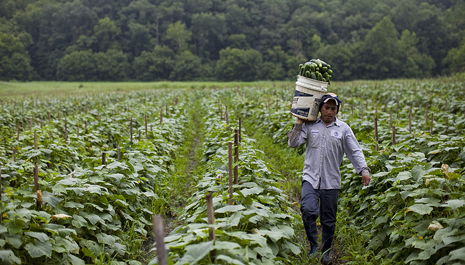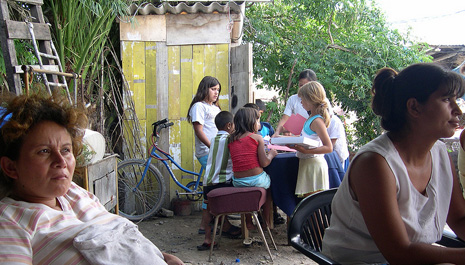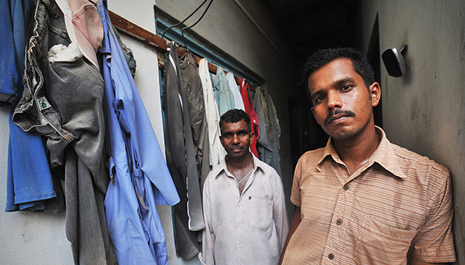Dynamics and Trends
(Research papers and policy briefs below)
Today, more than 90 per cent of world's migrants are either economically active—working in remunerative activity—or dependent on those who are. Migration today serves as an instrument to adjust the skills, age and sectoral composition of national and regional labour markets. Migration provides responses to fast-changing needs for skills and personnel resulting from technological advances, changes in market conditions, industrial transformations and restructuring of work itself. In countries of ageing populations, migration is replenishing declining work forces and injecting younger workers, in turn contributing to increased dynamism, innovation and mobility in those work forces. Migrant workers play a vital role in labour markets, labour force composition and economic progress in more than 100 countries today.
Labour circulation has become a crucial and recognized key to regional integration and development, whether among the members of the European Union, in the East African Community or in South America's Mercosur. "Free movement" is emerging as a key element in more than ten regional integration and common market cooperation schemes in Africa, the Americas, Asia, the Caribbean and in Eurasia, precisely because it is regulated and harnessed in regional, interstate spaces of economic and social integration.
On the "supply side", human displacement and migration are driven by absence or unavailability of decent work for many people, especially youth, in many countries. Warfare, widespread human rights violations, and environmental degradation are other major causes of involuntary displacement. Consequences of global warming may oblige increasing numbers of people to abandon homes and homelands made uninhabitable by rising sea levels, increasingly destructive storms and accelerated desertification.
New evidence based on more accurate forecasting suggests that the world may be on the eve of greater international mobility. Many Western countries have reached fertility rates of population—and work force—decline. This is, however, now becoming a global phenomenon. China's work force is forecast to decline by between 126 and 180 million people over the next 20 years. The Russian Federation workforce is currently loosing one million persons a year. Algeria, Argentina, Azerbaijan, Brazil, Colombia, Indonesia, the Islamic Republic of Iran, both Republic of Korea and Democratic Peoples Republic of Korea, Lebanon, Mauritius, Mexico, Morocco, Peru, Qatar, Saudi Arabia, Singapore, Tunisia, Turkey and Vietnam—among others—have reached or are now reaching zero population growth rates. Migration will be an inevitable component of compensating for population and work-force ageing and decline. In the case of China for example, in-depth analysis indicates that only some 20% of the expected workforce reduction can be compensated for by standard measures of expanding female workforce participation, raising retirement age, increasing productivity, and expected—slower—economic growth.
GMPA carries out research and forecasting on migration trends and dynamics to support evidence-based planning, policy formulation and practice for rights-based governance of migration, today and tomorrow.
Documents and Papers
- Maghreb migration, politiques en manque de boussole. M.Lahlou, mars 2023.
- Maghreb Migration Policies Bereft Compass. M Lahlou, March 2023.
- Special Issue Global Migration Challenges and Remedies: An interdisciplinary review RTE –Revista Tecnológica ESPOL, March 2022. (Articles are also individually accessible here)
- The rapporteur's report ( English / French ), Global Parliamentary Conference on refugees and migration, Istanbul, 20-21 June 2022
- Cities and migration: comprehensive study of cities welcoming migrants and refugees. O. Kadysheva (2022), Revista Tecnológica - Espol.
- Common Home: Migration and Development in Europe and beyond. Caritas Europa-GMPA, 2019.
- Common Home: Migration and Development national studies covering: Austria, Belgium, Bulgaria, Czech Republic, Germany, Italy, Netherlands, Portugal, Slovakia, Slovenia, and Sweden, 2019.
- Engaging the Diaspora and Migrant Workers for Home Country Development: Diaspora Finance and Remittances. P. Wickramasekara, E. Tennant & P.Taran (2018). ADBI – OECD – ILO.
- Migration, Development, Integration & Human Rights: Global Challenges in the 21st Century. Taran, 2018.
- Promoting better regional cooperation towards smart and humane migration across the Mediterranean: Rapporteurs Summary Statement. Taran, 2017.
- Cities welcoming refugees and migrants: enhancing effective urban governance in an age of migration. UNESCO-ECCAR-GMPA, 2016.
- Preferred terminology in migration discussions
- Brief for ITC SD Academy, Migration and Social Dialogue, TARAN, 2014.
- Rethinking Development and Migration: Some Elements for Discussion, TARAN, 2012.
- Immigration, Discrimination and Integration in Europe: Policy Options for the 21st Century, TARAN, 2005.
- Addis AU-RECs: Global Migration Context Assessment Note: Key Issues, Situations and Responses, TARAN, 2013.





